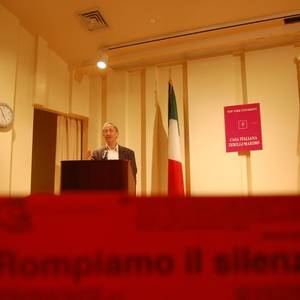Scientist Rita Levi-Montalcini turned 100. For the oldest living Nobel prize winner and Italian senator, there is no reason to stop fighting.
“What I did in the past is not enough — there is only the future.”
You chose: Facts & Stories
-
-
The famous Italian writer addresses a letter to her unfortunate Abruzzese fellows. i-Italy has translated the text for its readers. Hers are words filled with deep sadness but also great hope. She also mentions her important upcoming project: the opening of camp libraries for the displaced people in the Region
-
i-Italy met with Paul Ginsborg at New York University’s Casa Italiana Zerilli- Marimò. It was a unique opportunity to reflect on Italian democracy and the threats it currently faces. Is what Alexis de Tocqueville wrote about the “tyranny of the majority” still important?
-
Nature can be so ruthless, though in many cases, words have the same effect as an earthquake. While people in Abruzzo are living a nightmare, we still see the same humiliating television shows which may have the same effect as an earthquake...
-
Two days after the Abruzzo earthquake, members of the Italian American caucus of the New York City Council call upon everybody, regardless of their ethnic background, to assist with the relief effort
-
Italian-American and Italian institutions, organizations and associations in the United States are mobilizing to offer concrete support to the survivors of the earthquake that hit the Abruzzo Region last Monday. Find out how you can contribute to this cause
-
Touching words from one of our editors: Anthony Julian Tamburri, Professor and Dean (John D. Calandra Italian American Institute Queens College/CUNY). His feelings are i-Italy's
-
Facts & StoriesOn March 31, the Coccia Institute for the Italian Experience in America invited the Italian Ambassador to the United Nations Giulio Terzi di Sant’ Agata to Montclair State University where he gave a Special Lecture., “Responsibility to Protect – Toward a more compassionate international action: Italy’s past, present and future role"
-
Casa Italiana Zerilli-Marimò (NYU) in Manhattan. Historian and public intellectual Paul Ginsborg analyzes Berlusconi and his opposition at "Denuncia: Speaking Up in Modern Italy"
-
It took the International Criminal Court in Tanzania 15 years to convict one of the masterminds of the 1994 Rwandan genocide, Colonel Théoneste Bagasora. But just on the eve of the 15th anniversary of the genocide that saw more than 800,000 people brutally murdered in less than 100 days, this verdict came as a great victory for the people of this small land locked nation in central Africa.






































